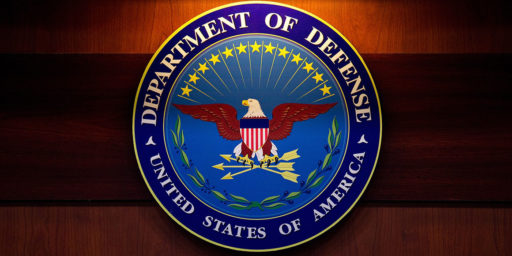Pentagon Brain Drain
The Pentagon is losing out to Google and other high tech companies in the quest to hire the best scientific minds, Phil Taubman reports for the NYT.
[Paul] Kaminski’s generation of engineers, responsible for many of the most successful military projects of the 1970s and ’80s, is aging and fewer of the nation’s top young engineers, software developers and mathematicians are replacing them. Instead, they are joining high-tech companies and other civilian firms that provide better pay than the military or its contractors, and greater cachet — what one former military industry engineer called “geek credit.”
One measure of this shift can be found at the Air Force: Through a combination of budget cuts, the demands of fighting two wars and the difficulty of recruiting and retaining top engineers, officials said, the number of civilian and uniformed engineers on the core Air Force acquisition staff has fallen 35 percent to 40 percent in the past 14 years.
So what? The Pentagon can just outsource the work to these geniuses, just paying when they need them, right? Not so much.
At a recent hearing of the Senate Armed Services Committee, the chairman, Carl Levin, D-Mich., said cost overruns on military projects, while long a problem, had “reached crisis proportions,” and he called for the creation of an internal Pentagon office to oversee costs.
A recent GAO study of 95 military projects worth $1.6 trillion reported projected cost overruns totaling $295 billion, or 40 percent, and an average delay of 21 months. A prime culprit was often deficient engineering management. By comparison, the study found that the Pentagon’s 75 major programs in 2000 were 27 percent over budget and 16 months behind.
Despite the popular conception, the federal government does manage to hire quite a number of extraordinary people and Defense, State, and the Intelligence Community get more than their fair share of them. But it’s not likely that those people are going to ever be able to compete on a financial compensation or “geek cred” basis with Google and Microsoft. The federal service is likely going to have to continue to attract people on the basis of psychic rewards like “making a difference,” “service to country,” and the opportunity to work with “the kind of people who enjoy jumping out of airplanes.”





No, but one of the things we *do* get to compete on is “I know cool stuff that you don’t because it’s classified” cred. 😀
I can’t speak for anyone else, but for me, that feeling lost it’s cachet after a couple of years. By the time I retired from the Navy, I regarded it as a supreme pain in the ass that I couldn’t talk to anyone about my job.
Russell: I include the “cool” factor in the last category, “the opportunity to work with ‘the kind of people who enjoy jumping out of airplanes.'”
But, yeah, I think Boyd’s right in the longer term. Trying to keep straight what you got off SIPRNET vice NIPRNET is a pain, especially when almost everything in a classified doc is readily available in the open source world.
I think it’s likely to be an especially tough sell for a systems engineering job, which is a step further removed from the spooks and trigger pullers. Not many people think of paper shufflers, no matter how vital they are to the mission or incredibly well trained they must be to do this kind of job well, as part of the “cool club.”
Oh yeah? Prove it.
“Oh yeah? Prove it.”
By far the best rebuttal. Good sense of humor there.
More seriously, both James and Boyd are right that there are serious limits to how much of a “perk” that actually is, and drawbacks that go with it as well. For me, personally, it doesn’t actually end up being much of either a drawback or a perk – but I know people for whom it’s a *huge* perk. And people for whom it’s an equally huge drawback. Personality has a lot to do with this, I think. Either way, it’s not something that I think should be discounted here.
Government work also has several other serious perks associated with it. Job stability and security is dramatically higher than in the commercial world. There are exceptions, but in general overtime is less, paid time off is more (both sick leave and vacation), and deadlines are more generous. As a result of all of these, stress levels are generally much lower.
All of these apply to direct government employees more than to contractors, but are still somewhat true in the contracting world. These are infamous for contributing to the “lazy government worker” syndrome, but I also know plenty of very bright, very capable people who do good work for the government but chose government work over commercial for precisely these benefits.
Personally, I think the biggest reason the Department of Defense is losing the best and brightest minds is because they’re no longer pushing the cutting edge of technology. Most of those kinds of people, while they value money, care more about the work they’re doing. If you’re the best and the brightest, making a decent income isn’t a problem, almost by definition. And while the private sector can pay better for those people, government/contractor income at the top levels is not insubstantial. A low six figure income may sound small to the Silicon Valley crowd, but in Huntsville Alabama (or many of the other areas surrounding the military’s high tech research areas), it’s a pretty damn good living – especially if it’s a relatively stress free one.
But generally, the work isn’t very interesting. Aside from a few small pockets, the military is mostly adapting civilian technology for military use these days, whereas in the past it was the other way around. To the kinds of people the military wants to recruit, *this* is probably the single biggest problem. The interesting work is being done at Google or Microsoft Research or, a left field but true example, by video game developers. I speak from experience on the last one; I write software for the army, and most of my bookshelf is stocked with game development books from which I and my coworkers have gotten quite a bit of useful and relevant knowledge.
Blah. This got really long for a comment. I wish I had kept my own blog more active now, and I’d just put it up there. But the brain drain is part of a much larger problem of the military just falling behind the civilian world. Thankfully (a topic for another long post), our military has done this FAR LESS than any other military in the world. But that won’t necessarily be the case forever.
“Making a difference”? Seriously you want to compare the Air Force to Google on that playing field?
Uh, good luck with that…
Tlaloc – that depends on what you want. I had a blast doing a sounding rocket launch program that took me to some very interesting places. Nowadays I do exactly the kind of things that I can’t talk about, but that’s okay. I don’t need recognition from outsiders, just the satisfaction of knowing my peers appreciate what I do.
One more way the debacle in Iraq has damaged our national security footing. Maintaining our lead in military technology is crucial, and it sounds like we are headed in the wrong direction.
China may give us a really nasty surprise one of these days…
Squall torpedoes may not be a surprise but they seem kind of nasty.